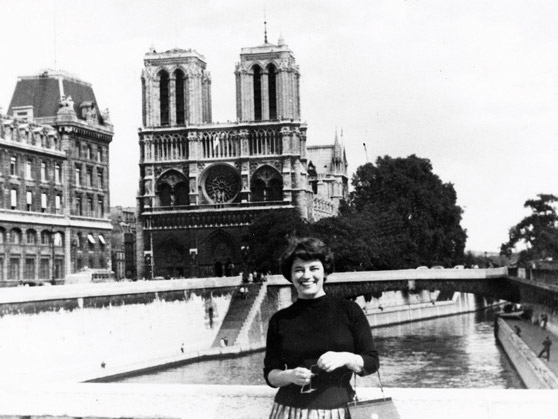 |
| Mavis Gallant |
Mavis Gallant
Imagine Paradise
by Adam Leith Gollner
February 18, 2014
Mavis Gallant was a family friend of ours. My mother knew her well. I remember her visits when I was a child: she was so intelligent, wry, and observant—so funny and so cool, with her Parisian air of detachment. She was fascinated with my platinum-haired younger brother, Julian, whom she deemed a “changeling.”
While passing through Paris in my late twenties, at work on my book The Fruit Hunters, I once stopped in to bring her a letter from my mother and some flowers. Not wanting to interrupt her writing, I suggested coffee or a glass of wine. She insisted we meet at Le Dome for lunch.
I arrived five minutes early, left her bouquet on the table, and went out to pick up a Herald Tribune. Workers were marching in the streets as part of a general manifestation against the government. By the time I returned, she was sitting there, beaming. She waved at the protesters, she whose May 1968 diary for The New Yorker concluded, “I am convinced that I have seen something remarkable.”
We had oysters. She chose Cancales, which she said were the tsars’ favorites. The oysters arrived shucked, but still attached to their bottom adductor muscle. “The difference between France and North America,” she explained, as though letting me in on a highly confidential secret, “is that the French like their oysters living and North Americans like their oysters dead.”
We spoke about writing, and living, and Montreal, which she left as a twenty-eight-year-old reporter to become a writer of short fiction in Paris. She didn’t like being around other writers, she confided, but she’d make an exception for me. I protested that I wasn’t yet a writer, that I wasn't even sure I’d be able to finish a book. She spoke with acceptance, and some sadness, of the Dreyfus book she’d toiled on for years before finally shelving it. “I still have a thousand pages of it sitting in a linen closet, underneath my towels,” she said, looking up in resignation.
I thought of that indelible scene in The Other Paris, the one where a chunk of plaster bearing the foot of a nymph detaches itself from the theater ceiling and crashes to the floor.
Mavis seemed genuinely curious about my quest for fruits. I was en route to the Seychelles, once thought to be the literal site of the Garden of Eden. She spoke of how wonderful it would be if paradise turned out to be real, if we could taste its fruits in this lifetime. “Imagine?” she said. We both did so for a moment, and I wished I could see what she was seeing.
When we parted, on the boulevard du Montparnasse, I leaned over to give her a kiss on the cheek. “If you do find paradise,” she said, turning to leave, “send me a grape.”
She’ll be missed and mourned by all of us who knew and loved her, as well as those who admire her stories. Whether or not paradise exists, may you rest in peace, Mavis.
Adam Leith Gollner is the author of The Book of Immortality, which received the Mavis Gallant Prize at the 2013 Quebec Writers’ Federation Awards.




No comments:
Post a Comment